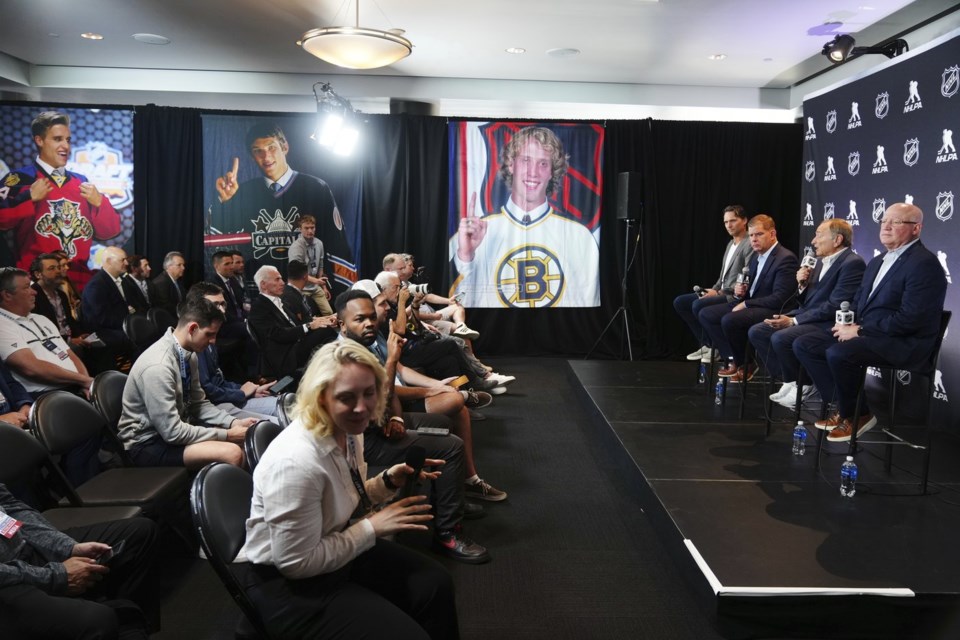LOS ANGELES — Gary Bettman and Marty Walsh hinted earlier this month they were closing in on a deal.
The NHL and NHL Players' Association made it official Friday — hockey is set to enjoy at least five more years of labour peace.
The league and its union announced the parties have agreed to an extension of their collective bargaining agreement through the 2029-30 season.
The NHL and NHLPA, which signed a memorandum of understanding following talks that began back in the spring, revealed the pact ahead of the first round of the league's draft.
"While we didn't agree on everything, we had a very constructive, professional, collaborative collective-bargaining process," Bettman, the NHL commissioner, said of an extension that still requires ratification on both sides. "We identified the issues that were important."
Walsh, who has served as NHLPA executive director since February 2023, said the two sides came to some "good resolutions" at the bargaining table.
"Happy with the process," he said at a morning press conference inside the Peacock Theater ahead of the opening round of the NHL draft. "Hopefully, the players will be happy with the outcome."
The league and union had previously described talks as positive, a far cry from the boardroom strife that has gripped the sport in the past and led to a number of work stoppages, including a lockout that doomed the entire 2004-05 campaign.
Along with increasing the regular-season schedule to 84 games per team and truncating exhibition play, reports indicate the CBA will see a shortening of the maximum length of contracts and the addition of a playoff salary cap.
Bettman and Walsh, however, both declined to offer many details on the NHL-NHLPA document, with votes on both sides still to come.
"That's been widely rumoured," Bettman said of an expanded regular-season calendar. "That's certainly one of the things that was a topic of discussion."
Walsh said a four-year deal was the right call for his membership.
"It's important for us to try and capture the thoughts and process of the players at that time," he said. "This generation of players changes, so we want to make sure we get them active in it. If this was a long, drawn-out battle, we would have had a lot of players that hadn't gone through (the 2012-13 negotiation) and hadn't gone through negotiations in the past.
"It puts them at a disadvantage."
The league respected that view.
"I could always have gone longer," Bettman said. "But we thought based on the way the players' association was focused on this and what was important to them, we were good with it."
Toronto Maple Leafs centre John Tavares, who inked a four-year contract extension Friday, said the news is positive for the game.
"There's been tremendous growth and what's ahead is spectacular on many fronts," he said on a video conference call with reporters. "The predictability of things goes a long way for everyone in the sport.
"It's great to have that partnership and how collaborative it's been, which has been very different from 2012."
Players have been able to re-sign with their current team for up to eight years since 2013 and agree to a contract with another club for seven. The new CBA would reportedly see both scenarios cut by one season.
A playoff salary cap, meanwhile, would prevent teams from using long-term injured reserve loopholes to load up rosters ahead of the post-season.
Previous rules allowed clubs with players on LTIR to exceed the salary cap by roughly the same amount as the injured player's salary until the playoffs.
A consistent complaint from certain teams and fan bases alike, the Chicago Blackhawks, Tampa Bay Lightning and Vegas Golden Knights are among the organizations that have used the system to load up for post-season runs.
"The game's changing," said Walsh, who wouldn't bite when asked about the playoff cap. "The players see the game changing. Every generation of players, you think about how the game has changed, the rules have changed, the compensation has changed.
"The thing that we look at is, as a union, not just the salary cap and salaries. We look at the benefits, we look at the pensions, we look at the quality of life — all of that stuff. We have to take all that into account."
The league and union have been working off the memorandum negotiated to finish the 2019-20 season during the COVID-19 pandemic. This new deal melds that agreement with the framework from 12 years ago, after the 2012-13 campaign was reduced to 48 games because of a lockout.
"Marty and I have established a very good tone and a very good basis for our relationship going forward," Bettman said. "I am delighted."
This report by The Canadian Press was first published June 27, 2025.
Joshua Clipperton, The Canadian Press


